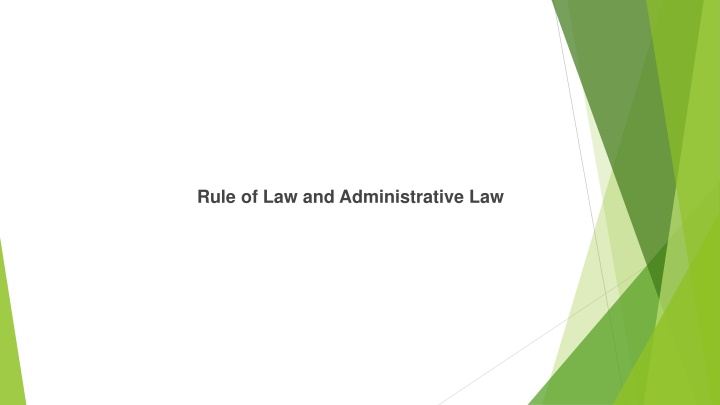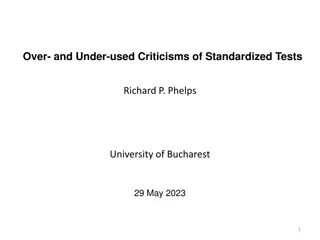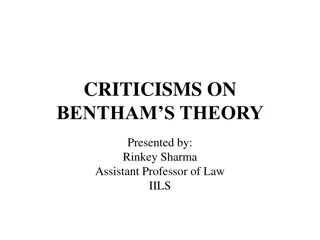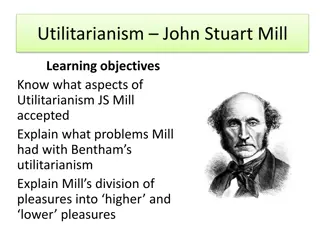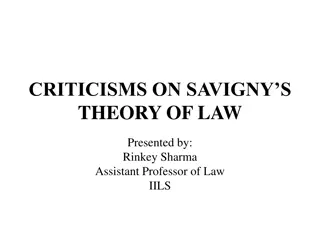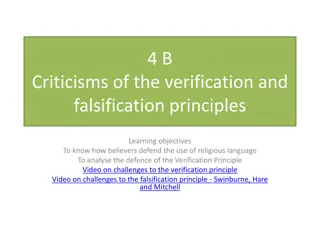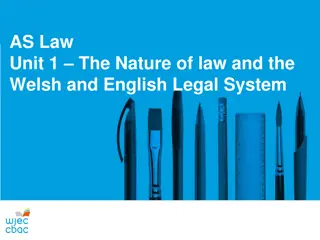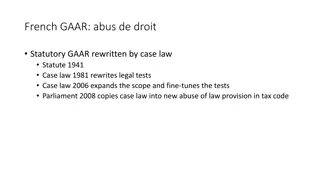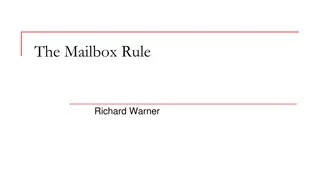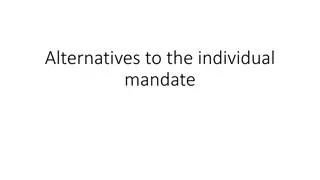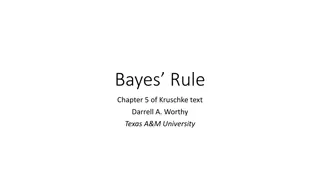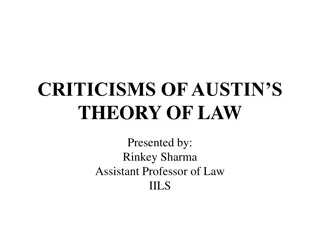Evolution and Criticisms of the Rule of Law
The rule of law, originating from classical Greece and emphasized throughout history, ensures equality before the law and limits arbitrary power. A.V. Dicey's three principles summarize this concept, emphasizing accountability for all, including government officials. While criticized for its limitations, the rule of law remains fundamental in democratic systems, safeguarding individual rights and liberties.
Download Presentation

Please find below an Image/Link to download the presentation.
The content on the website is provided AS IS for your information and personal use only. It may not be sold, licensed, or shared on other websites without obtaining consent from the author.If you encounter any issues during the download, it is possible that the publisher has removed the file from their server.
You are allowed to download the files provided on this website for personal or commercial use, subject to the condition that they are used lawfully. All files are the property of their respective owners.
The content on the website is provided AS IS for your information and personal use only. It may not be sold, licensed, or shared on other websites without obtaining consent from the author.
E N D
Presentation Transcript
Meaning and Origin The rule of law is a product of centuries of the struggle of the people for the recognition of their inherent rights.In classical Greece, Aristotle wrote that law should be the final sovereign . In 1215, the Magna Carta checked in the corrupt and whimsical rule of King John by declaring that the government should not proceed except in accordance with the law of the land. During the thirteenth century, Thomas Aquinas argued that the rule of law represents the natural order of God as ascertained through divine inspiration and human resource. In the seventeenth century, the English jurist Sir Edward Coke asserted that the king ought to be under no man, but under God and the law. Despite its ancient history, the rule of law is not celebrated in all quarters. The English philosopher Jeremy Bentham described the rule of law nonsense on stilts. The twentieth century has seen political leaders who have oppressed disfavoured persons or groups, without warning or reason, governing as if no such thing as rule of law existed. For many people around the world, the rule of law is essential to freedom.
The most famous exposition of the concept of rule of law has been laid down by A.V. Dicey (Law of the Constitution) who identifies three principles which together establish the rule of law: The absolute supremacy or predominance of regular law as opposed to the influence of arbitrary power. Equality before the law or the equal subjection of all classes to the ordinary law of the land administered by the ordinary courts; and The law of the constitution is a consequence of the rights of individuals as defined and enforced by the courts When explained, it amounts to, in Dicey s own words: every official, from the Prime Minister down to a constable or a collector of taxes, is under the same responsibility for every act done without legal justification as any other citizen. The reports abound with cases in which officials have been brought before the courts, and made, in their personal capacity, liable to punishment or to payment of damages, for acts done in their official character but in excess of their lawful authority. [Appointed government officials and politicians, alike] . And all subordinates, though carrying out the commands of their official superiors, are as responsible for any act which the law does not authorize as is any private and unofficial person.
Criticisms Dicey s concept has been criticized because of the predominance of ordinary laws and the absence of arbitrary power. Discretionary power is a must when it comes to the application of laws by governmental agencies like impartial and independent tribunals. Due to these limitations, the rule of law still remains a cardinal principle of every democratic government. It is true that delegated legislation and administrative jurisdiction are both the worst enemies of the rule of law. The development of delegated legislation and administrative justice, however, are not only inevitable but also, with proper modification and safeguards, desirable. Dicey s notions may have been criticized but the main idea behind the rule of law still holds i.e. protection of individual rights and liberties. For a democratic government, the rule of law is a basic requirement; and for the maintenance of the rule of law, there must be an independent and impartial judiciary. It is embodied in the concept of rule of law that equality before the law or equal protection of laws is ensured to all citizens, and every citizen is protected from the arbitrary exercise of power by the state. Thus, in a state professing the rule of law, the aim should be to provide for a system which secures to its citizens adequate procedure for the redress of their grievances against the state before forums, which are able to administer justice in an impartial manner without any fear or favour. Each country has devised its own system to ensure the maintenance of the rule of law. The rule of law pervades the entire field of administration and regulates every organ of the state.
Rule of law in India The Constitution of India specifically provides that the state shall not deny to any person equality before the law or the equal protection of the laws. The concept of rule of law would lose all its vitality if the instrumentalities of the State are not charged with the duties of discharging their functions in a fair and just manner. It has been held that the rule of law pervades the constitution as its basic feature and cannot be taken away even by an amendment of the constitution. In a system governed by rule of law, discretion, when conferred upon executive authorities, must be confined within clearly defined limits. This means that decision should be made by the application of known principles and rules and, in general, such decisions should be predictable and citizens should know where he stands. The Constitution lays down in Part IV the directive principle of state policy. It enjoins the State to bring about a social order in which justice social, economic and political shall govern all the institutions of national life. The rule of law promotes the lofty ideals enshrined in the directive principles of state policy and draws its sustenance from the higher judiciary, which upholds the constitutionality of laws keeping in view the philosophy of these ideals. A growing threat to the rule of law is coming from undue delay in judicial proceedings. In order to ensure the rule of law, the system must, therefore, ensure effective and expeditious remedies against the violation of laws.
Basic Principles of the Rule of Law Law is Supreme, above everything and everyone. Nobody is above the law. All things should be done according to law and not according to whim. No person should be made to suffer except for a distinct breach of law. Absence of arbitrary power being the heart and soul of the rule of law. Equality before the law and equal protection of the law. Discretionary power should be exercised within reasonable limits set by law. Adequate safeguard against executive abuse of powers. Independent and impartial Judiciary. Fair and Just Procedure. Speedy Trial
Rule of Law and Indian Constitution In India the Constitution is supreme. The preamble of our Constitution clearly sets out the principle of rule of law. It is sometimes said that planning and welfare schemes essentially strike at rule of law because they affect the individual freedoms and liberty in many ways. But the rule of law plays an effective role by emphasizing upon fair play and greater accountability of the administration. It lays greater emphasis on the principles of natural justice and the rule of speaking order in an administrative process in order to eliminate administrative arbitrariness.
Case laws In an early case, S.G. Jaisinghani V. Union of India and others the Supreme Court portrayed the essentials of rule of law in a very lucid manner. It observed: The absence of arbitrary power is the first essential of the rule of law upon which our whole constitutional system is based. In a system governed by rule of law, discretion, when conferred upon executive authorities, must be continued within clearly defined limits. The rule of law from this points of view means that decisions should be made by the application of known principles and rules and, in general, such decision should be predictable and the citizen should know where he is. If a decision is taken without any principle or without any rule it is unpredictable and such a decision is the antithesis of a decision taken in accordance with the rule of law . The Supreme Court in a case, namely, Supreme Court Advocates on Record Association v. Union of India , reiterated that the absence of arbitrariness is one of the essentials of rule of law. The Court observed. For the rule of law to be realistic there have to be rooms for discretionary authority within the operation of rule of law even though it has to be reduced to the minimum extent necessary for proper, governance, and within the area of discretionary authority, the existence of proper guidelines or norms of general application excludes any arbitrary exercise of discretionary authority. In such a situation, the exercise of discretionary authority in its application to individuals, according to proper guidelines and norms, further reduces the area of discretion, but to that extent discretionary authority has to be given to make the system workable.
Conclusion The recent expansion of the rule of law in every field of administrative functioning has assigned it is a place of special significance in the Indian administrative law. The Supreme Court, in the process of interpretation of rule of law vis- -vis operation of administrative power, in several cases, emphasized upon the need of fair and just procedure, adequate safeguards against any executive encroachment on personal liberty, free legal aid to the poor and speedy trial in criminal cases as necessary adjuncts to rule of law. Giving his dissenting opinion in the Death penalty case, Mr. Justice Bhagwati explains fully the significance of rule of law in the following words: The rule of law permeates the entire fabric of the Constitution and indeed forms one of its basic features. The rule of law excludes arbitrariness, its postulate is intelligence without passion and reason free from desire. Wherever we find arbitrariness or unreasonableness there is a denial of the rule of law. Law in the context of rule of law does not mean any law enacted by legislative authority, howsoever arbitrary, despotic it may be, otherwise even in dictatorship it would be possible to say that there is rule of law because every law made by the dictator, however arbitrary and unreasonable, has to be obeyed and every action has to be taken in conformity with such law. In such a case too even where the political set-up is dictatorial it is the law that governs the relationship between men.
